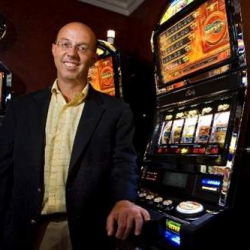
Gavin Isaacs, Former CEO of SHFL, Became CEO of Scientific Games When His Noncompete with Bally Technologies Ended in June 2014
Caesars Interactive is now going to host Delaware lottery gaming on its Atlantic City servers, in a first-of-its-kind interstate online lottery pact. The deal is in partnership with Scientific Interactive, the US lottery company which manages the Delaware state lottery. Scientific Interactive is a subsidiary of Scientific Games, which last year bought Bally Technologies for over $3 billion.
Scientific Interactive, a division of Scientific Games, will provide gaming opportunities to the Delaware Lottery’s online gambling platform. The servers for those games are going to be hosted on servers in Atlantic City.
DGE Approval for Arrangement
The Division of Gaming Enforcement gave their approval for the deal, which is the first of its kind in the new era of legalized online gambling in the United States. The Delaware Lottery also signed off on the arrangement.
DGE Acting Director David Rebuck said the came together with a spirit of cooperation between all four active entities. Rebuck said, “This arrangement exemplifies a great collaborative effort between the Delaware Lottery, the New Jersey Division of Gaming Enforcement, Scientific Games, and Caesars Interactive Entertainment.”
The new Internet hosting arrangement went live on Monday, though the parties did not announce this new development until Thursday, after the technicians could see if the system worked properly.
Marco Ceccarelli: Helps Online Regulated Market
Marco Ceccarelli, Caesars Interactive’s SVP and chief information officer, showed appreciation for the two regulatory bodies which allowed the interstate arrangement. Ceccarelli added, “We are happy to do our part assisting regulators in New Jersey and Delaware and appreciate their progressive and innovative work to help continue to grow and push the regulated online gaming market forward in the United States.”
Delaware has been an early leader in the interstate online gambling movement. Earlier this year, Delaware launched an interstate poker compact with Nevada, which helped the two small states grow their player pools. The deal was a minor advantage for both sides, but holds out the hope of becoming a major interstate force, if and when other states legalize online poker and join the compact. One might envision the Nevada/Delaware compact like a nascent version of the multi-state lottery associations, Powerball and Mega Millions.
At present, only three states have legalized online gambling: Delaware, New Jersey, and Nevada. Licensed online gambling operators in the three states collected $135 million last year in winnings. Divided among three states, that might be a negligable amount when it comes to tax revenues collected on the winnings. Those in the industry laying the groundwork thinks it’s still the tip of the iceberg.
Morgan Stanley’s Adjusted Predictions
Morgan Stanley predicts legalized online gambling will net $2.7 billion in winnings in only 5 shorts year, by 2020. The financial institution suggested 15 states would legalize iGaming by the time, including big states like Pennsylvania, California, and New York.
Still, Morgan Stanley’s estimates are far below they were when online gambling was first launched by New Jersey in November 2013. At the time, the 2020 prediction sat at $5 billion.
Technical and Legal Issues
Companies have faced a number of technical and financial hurdles to climb. The geolocation errors were fixed in the first 3 months after the rollout, but credit cards which decline are still a major hassle for many players in New Jersey. While new credit card bank codes were designed for Internet gambling, many financial institutions tied to Visa and Mastercard still are leery about the legality of online gambling.
People must remember that Visa and MasterCard are not one financial institution, but networks of 20,000 to 30,000 different banks and financial institutions worldwide. Each card issuer makes its own decisions regarding online gambling payments. Many are uncertain of the federal gaming laws, or simply unwilling to allow payments which might later be deemed illegal.
Caesars and Scientific Partnership
The deal between Caesars Interactive and Scientific Interactive is a sign of the evolving gaming culture of America. The more states who legalize gambling, the more interests there will be who want to protect state’s rights on the iGaming issue.
Getting a state-sanctioned lottery corporation involved is important, because most US states have state lotteries. Those state lotteries are going to see their interest in protecting their right to sell online lotto tickets, so they are likelier to oppose Sheldon Adelson’s Restore America’s Wire Act.
